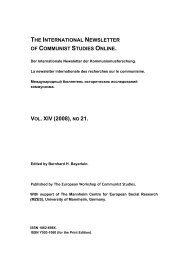11RXNdQ
11RXNdQ
11RXNdQ
Create successful ePaper yourself
Turn your PDF publications into a flip-book with our unique Google optimized e-Paper software.
naiveté, to be harmful at that time: as such, he was proud of it; he saw in it a fundamental<br />
trait of the African. The man of violence said to me several times:‘We black people are<br />
good; we have a horror of cruelty. For a long time, I believed that the men of Africa<br />
would not fight each other. Alas, black blood is being spilled, black men are spilling it,<br />
and it will be spilled for a long time to come. The whites are leaving, but their<br />
accomplices are among us, armed by them. The last battle of the colonized against the<br />
colonizers will often be that of the colonized among themselves.’ I know: the doctrinaire<br />
in him<br />
1 The Congolese National Movement.<br />
Colonialism and Neocolonialism 88<br />
saw in violence the ineluctable fate of a world in the process of liberating itself, but the<br />
man, deep down, hated it. The differences and the friendship between these two men<br />
symbolize both the contradictions that are ravaging Africa and the common need to<br />
transcend them in pan-African unity. And each encountered within himself the same<br />
heart-rending problems and the will to resolve them.<br />
The whole of Fanon’s story remains to be told. But the better-known Lumumba<br />
continues, despite everything, to guard many a secret. No one has really attempted to<br />
discover the causes of his failure, 2 nor why major capital and the bank were so bitterly<br />
opposed to a government whose leader never stopped repeating that he would leave<br />
invested capital alone and never stopped seeking new investments. The speeches you are<br />
about to read serve that end: they will allow you to understand why, despite the<br />
moderation of his economic programme, the leader of the MNC was considered by the<br />
revolutionary Fanon as a brother in arms and by the Société Générale as a mortal enemy.<br />
He has been accused of playing a double, even a triple, game. Before an exclusively<br />
Congolese audience, he would get carried away; he was able to calm himself when he<br />
discovered that whites were present and blow hot and cold skilfully. In Brussels, before a<br />
Belgian audience, he became prudent, charming, and his first concern was to reassure.<br />
This is in no way false; but the same can be said of all great orators: they quickly judge<br />
their audience and know just how far they can go. Moreover, the reader will see that<br />
while the form may vary from speech to speech, the basics do not change. No doubt,<br />
Lumumba developed: the political thought of the young author of Is the Congo, the Land<br />
of the Future, under Threat? – written in 1956 – is not that of the young but mature man<br />
who founded the MNC. He may have briefly dreamed of a Belgian-Congolese<br />
community (we will see later why), but from 10 October<br />
2 I would, however, like to refer to the very remarkable work by Michel Merlier, The Congo,<br />
published by Maspéro.<br />
1958 on, his opinion, from which he was not to waver, was formed and declared:<br />
independence became his sole aim.<br />
What varies the most, depending on his audience, is his judgement of Belgian<br />
colonization. He often emphasizes its positive aspects (indeed, sometimes with so much<br />
complacency that you might imagine you were listening to a colonist): the development<br />
of the land above and below ground, the educational work of the Missions, medical aid,




